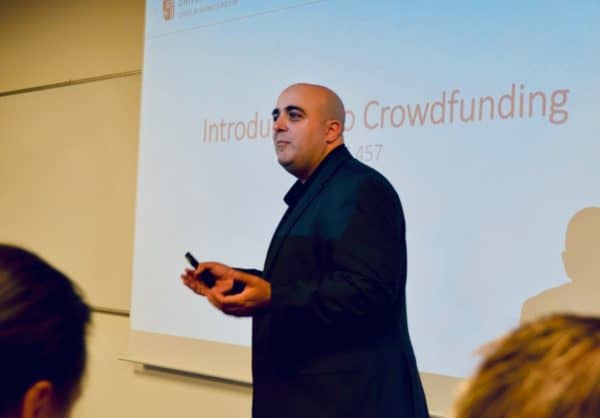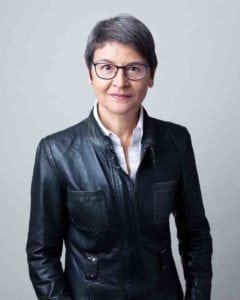
Rotem Shneor, Ph.D., and two colleagues, Liang Zhao, and Bjørn-Tore Flåten, are publishing “Advances in Crowdfunding – Research and Practice,” a 500-page compendium of articles by 30 contributors, mostly academic researchers, about everything you ever wanted to know about crowdfunding across business models, sectors, and geographies.
Rotem is a well-known researcher and activist in crowdfunding. An Associate Professor at the University of Agder School of Business and Law in Norway, he is also the academic director of the university’s Center of Entrepreneurship and associate researcher with the Cambridge University Center for Alternative Finance in the United Kingdom. In 2014, he co-founded the Nordic Crowdfunding Alliance, of which he remains a board member.
You may read or download (for free) “Advances in Crowdfunding – Research and Practice” by clicking here.
Rotem kindly shared with Crowdfund Insider the insights he gained from leading this latest, most impressive publication and, more generally, from his in-depth experience and analysis of the crowdfunding market.

Hi Rotem. You have been researching and analyzing online crowdfunding since its infancy, what brought you to this field of research?
Dr. Rotem Shneor: I started my career in business development before specializing in academic research on entrepreneurship. Working with entrepreneurs for many years, I observed firsthand how difficult it was for growth companies to access finance. The problem is quasi-universal. Most parts of the globe lack an efficient infrastructure to provide project owners with access to financing.
Around 2011, we started to explore the, then still emerging, world of crowdfunding platforms. I had always believed in the power of digitizing the fundraising process and became fascinated with the crowdfunding solution. The trigger to starting serious academic research on this topic came from substantial funding from the Nordic Council. We started a crowdfunding research center at the University of Agder which now has six researchers.
How does academic research in crowdfunding work? How do you cooperate with businesses?
Dr. Rotem Shneor: The status of academic research in crowdfunding is quite particular. The crowdfunding sector is young. Academic researchers like our research group started researching the sector very early on, while it was still in its infancy. We were welcomed by crowdfunding entrepreneurs because we provided them with the facts, figures, and analyses that they needed to legitimate the sector in the eyes of customers, investors, and authorities. Thus, there was and still is an exceptionally good level of cooperation between platform companies and academic researchers. Entrepreneurs enjoy our free research!
You are now publishing a 500-page report that spans all forms of crowdfunding across business models, geographies, and sectors. How did this comprehensive compendium come about?
Dr. Rotem Shneor: This report results from the collaboration of 30 researchers from research institutes from around the world who, like us, are early movers in the sector. Thanks to them and their experience as academics as well as as practitioners with tight links to the sector, we were able to look back on nearly 20 years of crowdfunding experience, to draw lessons from that experience, and to try to predict the future.
It was a lot of work, but it was also really nice to work with such an international team. To give you an idea of the diversity of locations of the contributors, I can name a few, such as the Cambridge Judge Business School in the UK, the University of Hamburg in Germany, the University of Utrecht in the Netherlands, Aalto University in Finland, the Indian institute of management of Bangalore in India, the Shanghai Jiao Tong University in China, and Mzumbe University in Tanzania.
Talking about the content of your report, can you share the main insights you gained from this comprehensive analysis of crowdfunding around the globe?
Dr. Rotem Shneor: The first insight, it that this work helps us see that there is no one-size-fits-all crowdfunding. Crowdfunding requires adaptation to the unique circumstances of each country, being in Africa or in the European Union. We are used to talking about Europe, for example, as if it were one homogenous region and to talk about technology as if it were this great unifying principle that overcomes local differences. In reality, even within Europe, there still are different regulations, different cultures, different views about what people consider proper and what not, and different consumption patterns.
The second insight is about market dynamics. Crowdfunding is a solution to a very painful problem, the lack of access to finance. Everybody knows there is a problem. However, driving a sustainable alternative proposition is not easy. It requires a combination of regulation, formal and informal market education, and responsible practice. If one of these elements is missing, the market will not develop healthily. The market players, the stakeholders create the new reality. There is no given. The way each one operates has a big impact on the development of the market.
The third one is that it is important to resist the very strong temptation to regress to the “old ways of doing business.” It is important to persist in developing crowdfunding as a true alternative.
What is, according to you, the essence of how crowdfunding differs from “the old ways of doing business?”
Dr. Rotem Shneor: The democratic element. Crowdfunding is about opening up the opportunities for both fundraising and capital building. Project owners get access to funds they could not get access to before. Retail investors get access to investments they were excluded from before. They get a say in what gets funded or not.
Crowdfunding overcomes the old ways and categories. It creates a common ground for communists and capitalists. Capitalists see it as an open market where the free flow of information lets the market determine the best options. Communists see it as a collective market where resources are not concentrated in the hands of a few but distributed among the many. To illustrate this point, in Norway, both the communist party and the most liberal party both raise funds through crowdfunding.
What should the crowdfunding sector pay attention to?
 Dr. Rotem Shneor: It is very important to understand the industry dynamics and in particular the dilemmas that the industry is facing.
Dr. Rotem Shneor: It is very important to understand the industry dynamics and in particular the dilemmas that the industry is facing.
The industry came out as an idealistic solution to the 2008 financial crisis. Its goal was to open up financial markets, to give everybody equal access to finance. It was motivated by innovation as well as by idealism. However, once companies are established, they need more resources to fuel their growth. This often leads them to cooperate with big banks and other large financial institutions, which in turn leads them away from their idealistic onset and their innovation goals. Regulation usually also pushes them into this direction because it requires them to put into place expensive controls and processes. They risk losing their edge.
Another related dilemma is the stress on financial value versus social value. To measure crowdfunding performance, we usually quantify how much money was raised and how many companies were funded. But this is only the financial value. What about the other values: job creation, cultural productions, and the civic and common goods that wouldn’t otherwise be produced because companies and individuals would not have the necessary resources? We do not quantify this social value creation even though it is very important for people and for their governments. Platforms need to create indicators that will reflect these other forms of value creation. The authorities, who do a great job at requiring the publication of financial numbers, should also require these social indicators. I believe that crowdfunding platforms would perform better on this level than traditional companies.
I would also to mention the tension between crowd wisdom and crowd madness. We like to think that the majority vote of investors will bring the best performance to light. But we know that the majority is not always right. How do we prevent the tyranny of the majority? How do we avoid crowd madness, and protect people from doing things against their better judgment? How do we foster projects from minorities? The solution lies in education and ethical best practices. For example, we need to put processes in place to provide equal exposure to projects from minorities and to educate minority members to run the effective type of campaign that will profit from this exposure. Regulation can help here, too.
Online crowdfunding took off after the 2008 financial crisis, how do you see it now going through the economic crisis created by the COVID-19 pandemic?
Dr. Rotem Shneor: Crises are amplifiers of innovation. We foresee that in the short term the pandemic crisis could slow down crowdfunding. But in the mid-term, it will be an accelerator. The most difficult part of driving innovation is to get people to try something for the first time. The crisis will lead new entrepreneurs and investors to try crowdfunding. More people will need money than ever. More investors will see crowdfunding as an opportunity to get better return for their investment in a transparent way.
Governments will also get less tax income. They will be more willing to directly resort to crowdfunding or encourage people to use crowdfunding. In the past, arts and culture have been the pioneering sectors of crowdfunding, the first ones to reach out to the public to finance their projects. In a crisis, they are the first to get budget cuts and will turn again to crowdfunding.

Therese Torris, PhD, is a Senior Contributing Editor to Crowdfund Insider. She is an entrepreneur and consultant in eFinance and eCommerce based in Paris. She has covered crowdfunding and P2P lending since the early days when Zopa was created in the United Kingdom. She was a director of research and consulting at Gartner Group Europe, Senior VP at Forrester Research and Content VP at Twenga. She publishes a French personal finance blog, Le Blog Finance Pratique. Torris is also a graduate of INSEAD.

